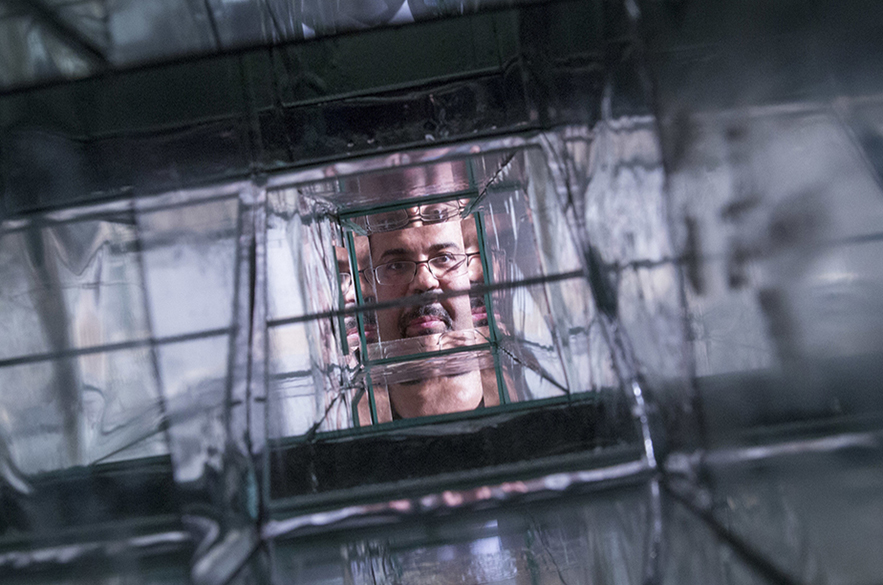Sun in the oven! A solar cooker for INSIDE the home
A solar cooker that heats food by concentrating the sun’s rays can be used inside the home thanks to new research by Nottingham Trent University.
By Chris Birkle | Published on 26 April 2019
Categories: Press office; School of Architecture, Design and the Built Environment;
A solar cooker that heats food by concentrating the sun’s rays can be used inside the home thanks to new research by Nottingham Trent University.
The project aims to allow people in hot, arid countries with sun all year round to cook indoors without the need for gas, electricity or burning wood.
The technology works by capturing sunlight on the outside of a property and concentrating its power with Fresnel lenses.
This concentrated light is reflected through channelling into a small space in the centre of a highly-insulated aluminium oven, which is fitted with thermal bricks.
A sensor provides live data on oven temperature and the level of heat can be controlled by reflecting away some of the concentrated light.
In a hot country like Kuwait, with long periods of sunlight, just three Fresnel lenses could provide an oven temperature of around 200˚C, the researchers say.
On a clear summer day in the UK it could be possible to achieve similar temperatures with only ten Fresnel lenses.
Professor Amin Al-Habaibeh – of the School of Architecture, Design and the Built Environment – led the team which made a small-scale prototype to prove the concept. It was in collaboration with three students on an exchange programme and was later improved by a separately funded project.
The prototype has three Fresnel lenses and can reach 60˚C on a typical summer day in the UK. It was recently tested and successfully cooked an egg.

Prof Amin Al-Habaibeh
Professor Al-Habaibeh said: “This is a very exciting project as this technology has the potential to change the way millions of people cook at home and could dramatically reduce the world’s carbon footprint.
“In hot countries which have sunshine all year round, there really is no need for people to cook using electricity, wood or gas.
“We have proved that it’s possible to cook food inside the home by harnessing the power of the sun. Until now other solar cookers have been designed only for use outdoors.”
Bubaker Shakmak, a postdoc researcher at the university who worked on the project, said: “Not only is this technology better for the environment, but it can help people in developing countries who don’t have access to electricity or gas.
“By providing this technology at an affordable price, people would be able to heat food more quickly, easily and sustainably than ever before.”
- The co-designers who attended NTU on the Erasmus exchange programme were Isabelle Heimans, 23, of Saxion University of Applied Science, Netherlands; Bastian Enste, 23, of Germany, who studies at the University of Southern Denmark; and César Castaño Vicente from Polytechnic School of Catalunya in Vilanova I la Geltrú, Spain. Further improvement was supported by Dr Allan Hawas.
Notes for Editors
Press enquiries please contact Chris Birkle, Public Relations Manager, on telephone +44 (0)115 848 2310, or via email; or Helen Breese, Public Relations Manager, on telephone +44 (0)115 848 8751, or via email.
Nottingham Trent University (NTU) was named University of the Year 2019 in the Guardian University Awards. The award was based on performance and improvement in the Guardian University Guide, retention of students from low-participation areas and attainment of BME students. NTU was also the Times Higher Education University of the Year 2017, and The Times and Sunday Times Modern University of the Year 2018. These awards recognise NTU for its high levels of student satisfaction, its quality of teaching, its engagement with employers, and its overall student experience.
The university has been rated Gold in the Government’s Teaching Excellence Framework – the highest ranking available.
It is one of the largest UK universities. With nearly 32,000 students and more than 4,000 staff located across four campuses, the University contributes £900m to the UK economy every year. With an international student population of more than 3,000 from around 100 countries, the University prides itself on its global outlook
The university is passionate about creating opportunities and its extensive outreach programme is designed to enable NTU to be a vehicle for social mobility. NTU is among the UK’s top five recruiters of students from disadvantaged backgrounds. A total of 82% of its graduates go on to graduate entry employment or graduate entry education or training within six months of leaving. Student satisfaction is high: NTU achieved an 88% satisfaction score in the 2018 National Student Survey.
NTU is also one of the UK’s most environmentally friendly universities, containing some of the sector’s most inspiring and efficient award-winning buildings.
NTU is home to world-class research, and won The Queen’s Anniversary Prize in 2015 – the highest national honour for a UK university. It recognised the University’s pioneering projects to improve weapons and explosives detection in luggage; enable safer production of powdered infant formula; and combat food fraud.